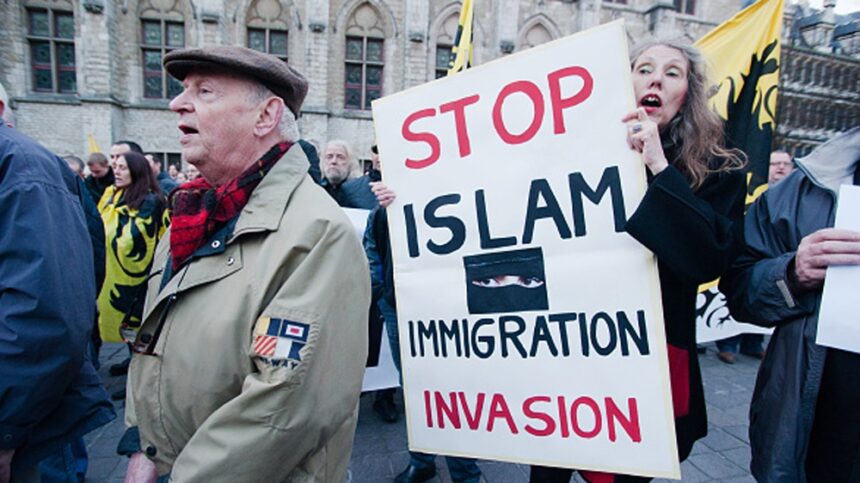BRUSSELS – Rising anti-Muslim attitudes in Europe and the UK are changing political alliances and increasing divisions. The continent, once seen as a model for multiculturalism after World War II, now struggles with hostility linked to immigration, cultural differences, crime and fears over security.
This shift has lifted right-wing parties, put pressure on the European Union and led to heated arguments about identity, self-rule and the future of democracy. Tighter immigration laws in Portugal and the risk of a no-confidence vote against European Commission President Ursula von der Leyen are just some signs of a deeper crisis.
The number of Muslims living in Europe, which stands at around 15–20 million or about 4–5% of the whole population, has climbed in recent years. Conflict and unrest in places like the Middle East and North Africa have driven many to seek safety in Europe.
The 2015 refugee arrival, when over a million migrants reached the EU, changed the public mood. In many countries, but especially in Eastern Europe, people started to link immigration with a loss of national culture and higher security risks.
The National Intelligence Council has suggested that the Muslim population in Europe could double by 2050, increasing these worries.
Many critics believe Muslim newcomers do not blend in, holding on to traditions seen as at odds with European values like secular government, gender fairness and open debate. Research, such as surveys noted by the Brookings Institution, shows that some Europeans view Muslims as less integrated into society.
Visible signs, such as prayer at work, modest dress and halal food requests, have been picked out as proof of cultural separation.
There are claims of certain areas in cities becoming “no-go zones” under informal Sharia rules rather than national law, though these reports are often disputed. Still, they play a big part in right-wing talk about a possible “Islamic takeover”.
Books and websites have pushed conspiracy theories, such as the “Eurabia” idea promoted by Bat Ye’or, which sees immigration as part of a plot to turn Europe into an Islamic region.
Academics disagree, and Pew Research predicts Muslims will make up around 8% of Europe’s population by 2030, yet the rumour sticks with people anxious about losing their traditional way of life.
Crime, Safety and Anti-Muslim Narrative
Incidents in the news have added more stress to these issues. The assaults on women in Cologne during New Year’s Eve 2016, blamed on men of North African or Middle Eastern backgrounds, became a talking point.
Certain politicians and news outlets used these events to frame Muslim immigrants as violent and hostile to women, bringing up cases like “honour killings” or organized crime to make their case. In the UK, stories about “grooming gangs” in towns such as Rotherham and Rochdale, often involving men of Pakistani heritage, have led to anger and suspicions towards Muslim communities.
These stories have made many women afraid to visit some places or wear some types of clothes because of what they see as higher risks. After the 2024 Southport attacks, which were wrongly linked to Muslims, the anti-hate group Tell Mama recorded a big spike in threats against Muslims, especially women. Muslim women who wear the hijab say they feel more at risk now than before.
Right-Wing Parties Gain Support
Anti-Muslim attitudes have boosted many right-wing political parties who claim to stand up for Europe’s “Christian” traditions against a supposed “Muslim invasion.” In France, Marine Le Pen’s National Rally party has built popularity by vowing to cut migration and limit Islamic practices in public.
In the Netherlands, Geert Wilders’ Party for Freedom speaks out against Islam, calling it incompatible with Dutch culture. Hungary’s Viktor Orbán has taken a hardline stance, even threatening to send migrants to Brussels.
Portugal has seen the Chega party climb to 18% of the vote in the 2024 election, breaking its run as a country without a far-right presence. Chega wants strict immigration controls and policies to protect Portuguese identity, joining a Europe-wide pushback against the EU’s proposals on asylum. The Portuguese government has followed with tougher rules, openly going against EU calls for broad agreement.
Sweden, once known for welcoming refugees, has shifted its position too. The Sweden Democrats argue there are links between recent arrivals and organized crime, such as gang violence.
Denmark’s “jewellery law,” which lets officials take valuables from asylum seekers, shows how some leaders are embracing strict measures. These policies, meant to defend national traditions, are now common even among centrist politicians.
The Debate over Sharia Law and “No-Go Zones”
Claims that Sharia law is replacing state law in parts of Europe are not backed by evidence. While some local religious groups handle disputes privately, nobody has shown that Islamic law is running entire city areas.
Still, this image remains popular in political speeches, especially after shocking incidents like the murder of French teacher Samuel Paty in 2020, which put fears about extremism back in the spotlight.
Some blame multicultural policies for failing to bring Muslim communities into mainstream society. They point to radical speakers in mosques and online as signs of deeper problems.
In response, countries such as France and Austria have started closing foreign-funded mosques and monitoring radical imams more closely. Germany now trains its imams, hoping they will share values that fit with German life. Swedish leaders like Deputy Prime Minister Ebba Busch have demanded that Muslims either adjust to Swedish customs or leave, showing less patience for a mix of cultures.
Internal Divisions Shake the EU
The European Union’s motto of unity is under strain. President Ursula von der Leyen’s European Commission faces a possible no-confidence vote after criticism over her handling of migration and claims of favouritism. Her plan to create “return hubs” outside the EU for detaining migrants has drawn sharp criticism, with Spain and others rejecting the idea.
Many see the EU’s latest migration deal as more about blocking newcomers than helping those in need. Shada Islam, a Brussels-based writer, says the EU has failed to address anti-Muslim hate, unlike its efforts for other minority groups, which has created distance with Muslim citizens and helped far-right parties.
The Visegrád countries (Poland, Hungary, the Czech Republic and Slovakia) have refused to follow EU migrant-sharing rules, weakening Brussels’ authority even more.
Doubts Over the “Great Reset” Approach
The phrase “Great Reset” has become a popular way for conspiracy theorists to attack EU policies on the environment and migration, saying they put outsiders before local people.
Critics, mostly from far-right backgrounds, say the EU’s top-down approach ignores real worries about changing national culture and economic hardships. The rise in these complaints has made more people skeptical of the EU, and some see Brussels as pushing a secret agenda.
Anti-Muslim feeling is not the same everywhere. Western European countries, despite recent problems, have seen fewer negative views towards Muslims since 2008. In Eastern Europe, where Muslim populations are small, unfounded fears are higher.
According to the EU Agency for Fundamental Rights, half of Muslims in Europe report facing racism often, especially when looking for jobs or housing, showing that strong anti-discrimination steps are still needed.
Solving these problems is difficult. Pressuring Muslim communities to fit in at all costs can backfire, but ignoring differences can deepen mistrust. Some experts like Kwame Anthony Appiah say that mutual give-and-take is key, so everyone adjusts and works towards living side by side. With right-wing parties growing stronger and the EU split on its next steps, finding a common way forward will not be easy.
Europe now faces a major test. Growing anti-Muslim feeling, together with big political changes, puts unity and social peace at risk. Only by working to heal these divides can Europe avoid further separation in the future.















